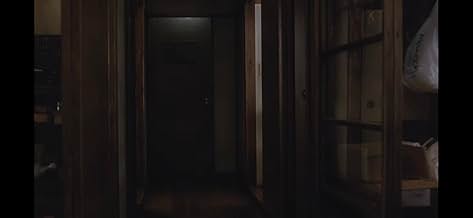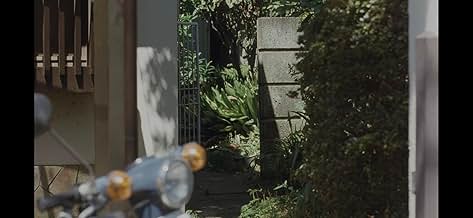A family gathers together for a commemorative ritual whose nature only gradually becomes clear.A family gathers together for a commemorative ritual whose nature only gradually becomes clear.A family gathers together for a commemorative ritual whose nature only gradually becomes clear.
- Awards
- 11 wins & 9 nominations total
- Director
- Writer
- All cast & crew
- Production, box office & more at IMDbPro
7.920.4K
1
2
3
4
5
6
7
8
9
10
Featured reviews
Complex and beautiful as life itself
Still Walking is an intimate movie about a family reunion. Its observations about family dynamics are the most true to life I have ever seen. The movie paints the entire gamut of emotional family experience with delicate yet powerful brush strokes but it's not a sentimental film, nor an opportunity for actors to grandstand. It's Japanese, so all the strong undercurrents of emotion are held in check by equally powerful restraint (both cultural and directorial). A brother and a sister attempting families of their own go to visit their parents in Yokohama. The parents have lost a son and the family's devastation hangs heavy in the air. You can actually feel it bearing down on your shoulders from the first frame. Anybody who has ever spent the night at the house of relatives will feel the weight of family history that this film captures so truthfully.
The parents are engulfed by their quiet, ongoing grief and the surviving children resent all the attention given to the one who is not there anymore. The movie is surprisingly mordant, touching, cruel, sad, funny: human. The mother is this wonderful woman who cooks up a storm (I so wanted to be invited to that house). She is from an older generation, which means she has been forever in the shadow of her husband the doctor, cooking and cleaning and feeding the children, but she is not a pushover, nor a saint. She is mischievous, catty and petty, prejudiced, funny, generous and cruel at the same time. She is a marvel, and the actress who plays her is astonishing.
This movie has many emotional surprises that make the audience gasp, but they are presented with a sure, light touch, never falling into easy sentiment, never shying away from human complexity. It's a film about family, and love and duty and regret and it is stunningly beautiful.
The parents are engulfed by their quiet, ongoing grief and the surviving children resent all the attention given to the one who is not there anymore. The movie is surprisingly mordant, touching, cruel, sad, funny: human. The mother is this wonderful woman who cooks up a storm (I so wanted to be invited to that house). She is from an older generation, which means she has been forever in the shadow of her husband the doctor, cooking and cleaning and feeding the children, but she is not a pushover, nor a saint. She is mischievous, catty and petty, prejudiced, funny, generous and cruel at the same time. She is a marvel, and the actress who plays her is astonishing.
This movie has many emotional surprises that make the audience gasp, but they are presented with a sure, light touch, never falling into easy sentiment, never shying away from human complexity. It's a film about family, and love and duty and regret and it is stunningly beautiful.
Rarefied endearing family story, disharmony ambiguously masked by revelry of sumptuous food and familial banters
"Still Walking" aka "Aruitemo Aruitemo" Yet another superb delivery from Japanese filmmaker Hirokazu Koreeda who gave us "Nobody Knows" in 2004. It's like we're eavesdropping on a private family reunion event. Central to the story is from the viewpoint of the second son, Ryota at age 40, going home to his parents' house via public transport with his new wife, a widow, and her 10 year old son from previous marriage. Yes, he doesn't own a car like his sister and brother in law. He's actually wary about hiding the fact that he doesn't have a substantial job and asks his wife not to breathe a word at the family occasion. His parents will be disappointed, especially his father who has counted on the second son to take on the family medical clinic business and be a doctor rather than any other trade - since the eldest died 15 years ago. Ryota has 'imprisoned' himself by these expectations which he is unable to, and frankly does not want to, fulfill. Underneath the pleasant bantering with his mother, we can tell he is struggling to find himself, make peace with himself and go on with his life.
Writer-director-editor Koreeda's passion provided us a close look (ever so casually, unhurried at its own pace so we get to be familiarized with each member of the family) on how a Japanese family might function on such a reunion gathering. We are put at ease watching mother and daughter preparing food in the kitchen, the whole family huddled around the meal table, the spontaneous exchanges. By and by, subtle clues are displayed and we may see the other side to each person's personality and hidden desires. Then there are pause moments to relish some family coziness or mother-son cordial exchanges. The storyline is far from 'flat' at its leisurely pace: "familiarity breeds contempt" or "absence makes the heart grows fonder" - either could be true. As the evening goes on, more aspects surface - be it mother, father, son, daughter in law, or grandson - we share their sentiments, satisfied or empathized.
"Still Walking" is a rich film. We are fortunate to experience it with so many levels rendered to us. I appreciate the reverence paid to the traditional family ritual of honoring the dead. Yes, a chance for a family outing, seeing Ryota and his 'new' family - wife and stepson - together is encouraging. The 'yellow butterflies' folklore is heartening.
The film also brings to mind quotes from Louise L. Hay's book, "Heart Thoughts - A Treasury of Inner Wisdom" on forgiveness (page 90): "We do not have to know how to forgive. All we have to do is be willing to forgive. The Universe will take care of the how." And on happiness (page 94): "Happiness is feeling good about yourself."
The theme music by Gonchichi is just right for the mood and state of inner peace - its guitar playing chords and melodic strains is quietly serene. What a soothing melody, giving the film a resigned, calming, happy with himself again leisurely tempo - simply apt to the story of "Still Walking." Visit the official site 'www.aruitemo.com' and you can listen to the music and check out 'Director's Statement' with Koreeda talking about his film.
Writer-director-editor Koreeda's passion provided us a close look (ever so casually, unhurried at its own pace so we get to be familiarized with each member of the family) on how a Japanese family might function on such a reunion gathering. We are put at ease watching mother and daughter preparing food in the kitchen, the whole family huddled around the meal table, the spontaneous exchanges. By and by, subtle clues are displayed and we may see the other side to each person's personality and hidden desires. Then there are pause moments to relish some family coziness or mother-son cordial exchanges. The storyline is far from 'flat' at its leisurely pace: "familiarity breeds contempt" or "absence makes the heart grows fonder" - either could be true. As the evening goes on, more aspects surface - be it mother, father, son, daughter in law, or grandson - we share their sentiments, satisfied or empathized.
"Still Walking" is a rich film. We are fortunate to experience it with so many levels rendered to us. I appreciate the reverence paid to the traditional family ritual of honoring the dead. Yes, a chance for a family outing, seeing Ryota and his 'new' family - wife and stepson - together is encouraging. The 'yellow butterflies' folklore is heartening.
The film also brings to mind quotes from Louise L. Hay's book, "Heart Thoughts - A Treasury of Inner Wisdom" on forgiveness (page 90): "We do not have to know how to forgive. All we have to do is be willing to forgive. The Universe will take care of the how." And on happiness (page 94): "Happiness is feeling good about yourself."
The theme music by Gonchichi is just right for the mood and state of inner peace - its guitar playing chords and melodic strains is quietly serene. What a soothing melody, giving the film a resigned, calming, happy with himself again leisurely tempo - simply apt to the story of "Still Walking." Visit the official site 'www.aruitemo.com' and you can listen to the music and check out 'Director's Statement' with Koreeda talking about his film.
Kore Eda does it again
I very much enjoyed Nobody Knows (Dare Mo Shiranai) and After Life (Wonderful Life) immensely and found another good and engaging movie with Still Walking. Kore Eda seems to be in a small group of directors who use minimal music and other traditional movie elements in order to convey the story to the viewer. Just as talking in a low voice will elicit the heightened command of a listener, so too does Kore Eda use subtle dialogue and action to focus the viewers attention to what's going on.
I can totally relate to the family in Still Walking because they come across as anyone's family. Literally. I felt as though I could have been watching my own family and not some Japanese family to whom I could not relate. All the elements are there from the big-city adult children coming to visit their small-town parents with their children en tow. The interplay between the fast pace of urban life and slow pace of rural life meet somewhere in the middle. Throughout, I felt as I usually do in a Kore Eda movie: a silent and invisible observer.
The premise of the movie is that the family gathers together once a year on the anniversary of the death of the eldest son who we learn had drowned saving the life of another person who himself was attempting to commit suicide by drowning in the sea. As you may know, in Japanese society, if you save the life of someone who wishes to commit suicide, you effectively are responsible for their life going forward. In this case, the person doing the saving, the eldest son, had died in the process. So we see the person who he saved return year after year to be reminded in an indebted but somewhat cruel manner that he is alive and that he will be, for the rest of the parent's of deceased lives, be required to suffer the (cultural) humility of "being alive" while their son is dead.
We also see the typical social dilemma of what to do as ones aging parents and additional interplay between the surviving son and his new, but widowed, wife and her child. We've seen the transaction a million times in other movies: mother in law has her comments and opinions, wife complains to the husband about her and her son's treatment, son has to either stand up to the parents or find some middle ground.
All in all, it's well played out and I was very pleased by this film. It's an amalgam of growth, change, sacrifice, forgiveness, and the road we all have to travel as we get older or if we have children ourselves. Oddly though, the film's title doesn't make sense until near the end of the movie.
I can totally relate to the family in Still Walking because they come across as anyone's family. Literally. I felt as though I could have been watching my own family and not some Japanese family to whom I could not relate. All the elements are there from the big-city adult children coming to visit their small-town parents with their children en tow. The interplay between the fast pace of urban life and slow pace of rural life meet somewhere in the middle. Throughout, I felt as I usually do in a Kore Eda movie: a silent and invisible observer.
The premise of the movie is that the family gathers together once a year on the anniversary of the death of the eldest son who we learn had drowned saving the life of another person who himself was attempting to commit suicide by drowning in the sea. As you may know, in Japanese society, if you save the life of someone who wishes to commit suicide, you effectively are responsible for their life going forward. In this case, the person doing the saving, the eldest son, had died in the process. So we see the person who he saved return year after year to be reminded in an indebted but somewhat cruel manner that he is alive and that he will be, for the rest of the parent's of deceased lives, be required to suffer the (cultural) humility of "being alive" while their son is dead.
We also see the typical social dilemma of what to do as ones aging parents and additional interplay between the surviving son and his new, but widowed, wife and her child. We've seen the transaction a million times in other movies: mother in law has her comments and opinions, wife complains to the husband about her and her son's treatment, son has to either stand up to the parents or find some middle ground.
All in all, it's well played out and I was very pleased by this film. It's an amalgam of growth, change, sacrifice, forgiveness, and the road we all have to travel as we get older or if we have children ourselves. Oddly though, the film's title doesn't make sense until near the end of the movie.
Pretty Wonderful Ozu Like Film
This film by writer/director Koreeda is a triumph of simplicity. Telling the story of a family who meet annually to mark the death of oldest son Junpei at the parent's house, you're struck by how well this flows. The acting is uniformly very good and the story never lags. The best thing I found about this film is how it could have been done without a script, if the actors were given this scenario. There is bitterness, pettiness and even selfishness here, all earmarks of the subject matter. I found the stylistic similarities to Ozu films to be very touching and not a bit off putting. When I watched this film in a theater in New York, people applauded at the end. This is about as real life as it gets. Its a universal theme, not a Japanese one. My hat is off to the writer/director, its a fine film.
Plot
Forty-something art restorer Yokoyama Ryota (Abe Hiroshi) reluctantly returns to his parents' home with his new wife Yukari (Natsukawa Yui) for a rare reunion. The family is holding a memorial for the eldest son who passed away 15 years ago, and Ryota has not been looking forward to the occasion. To his father (Harada Yoshio), Ryota can never compare to his late brother, and silent resentment has accumulated between father and son over the years. Likewise, Ryota's mother (Kiki Kirin) carries years of bottled frustrations and disappointments that slip out in casual, cutting remarks. Only sister Chinami (You) seems to somehow keep herself above the family drama. As the day wears on, the family runs through the simple gestures and complex emotions that keep them together and push them apart.
Did you know
- TriviaIn a 2009 interview, Koreeda stated that Still Walking was based on his own family.
- GoofsAt the end, when the grandparents cross the road after Ryota and his family depart by the bus, their positions change between shots at the zebra crossing.
- Quotes
Atsushi Yokoyama: There's nothing to watch on TV these days. They laugh so loud but nothing's funny.
- ConnectionsReferenced in Il était une fois...: Une affaire de famille (2021)
- How long is Still Walking?Powered by Alexa
Details
- Release date
- Country of origin
- Official site
- Language
- Also known as
- Even If You Walk and Walk
- Filming locations
- Production companies
- See more company credits at IMDbPro
Box office
- Gross US & Canada
- $167,047
- Opening weekend US & Canada
- $20,298
- Aug 30, 2009
- Gross worldwide
- $3,534,890
- Runtime
- 1h 55m(115 min)
- Color
- Sound mix
- Aspect ratio
- 1.85 : 1
Contribute to this page
Suggest an edit or add missing content





























